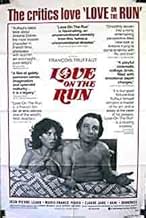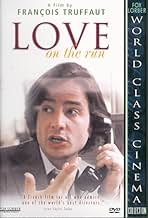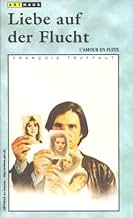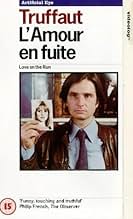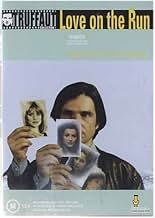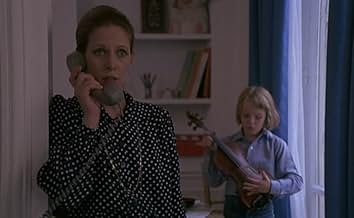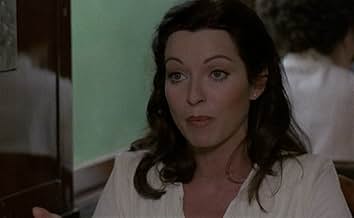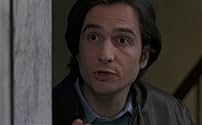Adicionar um enredo no seu idiomaAntoine Doinel is now more than thirty. He divorces from Christine. He is a proofreader, and is in love with Sabine, a record seller. Colette, his teenager love, is now a lawyer. She buys An... Ler tudoAntoine Doinel is now more than thirty. He divorces from Christine. He is a proofreader, and is in love with Sabine, a record seller. Colette, his teenager love, is now a lawyer. She buys Antoine's first published autobiographical novel. They meet again in a station...Antoine Doinel is now more than thirty. He divorces from Christine. He is a proofreader, and is in love with Sabine, a record seller. Colette, his teenager love, is now a lawyer. She buys Antoine's first published autobiographical novel. They meet again in a station...
- Direção
- Roteiristas
- Artistas
- Prêmios
- 1 vitória e 1 indicação no total
- Antoine Doinel
- (as Jean-Pierre Leaud)
- Sabine Barnérias
- (as Dorothee)
Avaliações em destaque
"L'Amour en Fuite" is the conclusion of the sentimental saga of the character Antoine Doinel, the insecure alter ego of François Truffaut that began in "Les Quatre Cents Coups" and followed through "L'Amour à Vingt Ans", "Baisers Volés" and "Domicile Conjugal", inclusive with the use of scenes in the many flashbacks of these movies with his recollections and troubled love affairs. This character has an evolution from the needy fourteen years old boy rejected by his mother and his stepfather in the first movie. The lack of affection at home makes him a rebel, bad student, liar, reckless and a thief stealing objects and money at home in his adolescence. In the next movies, he grows-up, but with a fragile emotional structure and the viewer sees an unstable man incapable of having a steady relationship or commitment with the many beautiful women that he meets along his futile life. My vote is seven.
Title (Brazil): "O Amor em Fuga" ("The Love on the Run")
This last part from 1978 shows us Doinel doing what he's also doing in the previous four parts - falling in love with numerous women, trying to keep up relationships, looking for love, flirting etc. While the first part from 1959 showed us Doinel's childhood in a poor family with a hard and beating father and his longing for respect and love, the following parts are less interesting in my opinion.
The final chapter is rather superfluous, with jokes falling flat, no real script, no suspense or a really interesting story line, and the actors are just running around most of the time. If you have watched the previous Doinel films it might be interesting to see this sequel (which is not really an end), but I suggest you to watch the first Doinel movie "Les 400 coups" ("The 400 Blows") instead, or Truffauts "L'homme qui l'amait les femmes" ("The Man Who Loved Women"), a far more interesting study on love, obsession and fetishism.
Here, all the women of Doinel's life appears together and now he has a chance to figure out why his relationships simply doesn't work. Recently divorced of Christine (Claude Jade), and involved with no good terms with Sabine, Doinel meets again Colette (Marie-France Pisier), his first love and they share some secrets, remember some moments when they two met for the first time, and both characters discover more things about each other, about life and about love.
At the trivia section is mentioned that Truffaut thought about making a huge mistake while filming this sequel, and I think he shouldn't be ashamed of it. It isn't much of a film since half of it it's flashbacks taken from all of Doinel's films plus a few moments of "Le Nuit Americaine" included as an interesting subplot of Doinel's romantic affairs (even though he plays a different character in that film). Compared to the other movies of the series this is less comical, a little bit too serious and it's more focused on how the kid that seems to never grow finally realizes what love really is than his amusing and funny life experiences as a working man.
But seeing all the flashbacks, those memorable moments covering 20 years of a person is breathtaking, refreshing, unique in all motion picture history. We can look back and see how much Antoine/Léaud changed through these years and some of us practically saw him growing up and I bet Truffaut must have loved this experience, seeing someone he could relate with and share some of his own experiences and see them portrayed on screen. One of the most touching moments of "Love on the Run" is the reunion between Doinel and the lover of his mother, whom he haven't seen in years, and the way they talk about the past, we see scenes from "The 400 Blows" when Doinel was a kid and saw him with his mother, and he hated the guy for it, then few years later they are happy to see each other, a bond between Doinel's troubled life and his life while a grown up man.
Most of the reviews on this classic are very superficial here. "Love on the Run" is a memorable, delightful and magic experience through great moments of one of the most interesting, inspiring and charming characters of all time, and this is his goodbye to us, always striving, always fighting, always believing in something and always managing to get what he wants even though we as audience might think he'll be lost forever. Doinel echoes a part of us that never should die: our youth. 10/10
The plot and emotional growth of the character is excellent. So why only a 7 for this film? Well, much of the film is simply cut and pasted from the previous Antoine Doinel films. This gave it a certain cheap look. Plus, what I really found inexplicable was that Truffaut used clips from Jean-Pierre Léaud films that were NOT about Doinel but pretended the clips were about him. In addition, clips from some Doinel films were shown but the entire scene is re-dubbed or explained in a way in which the scene did NOT appear in the original film. A good example is a clip from Stolen Kisses. The narrator says he (Doinel) was unlucky in love and followed attractive women because he'd become infatuated with them. However, this scene was actually of Doinel following a lady because he was a private detective in this film--this was NOT someone he was infatuated with. Those who remember this movie well will be shocked at how easy it is to spot this obvious change. Finally, for some odd reason, one of the clips from Stolen Kisses is shown in black and white, while all the others from the movie are in color. It just didn't make sense why this occurred.
These inconsistencies are not great film-making. Decent film-making, maybe. For a better Truffaut film, try watching The Bride Wore Black (my personal favorite) or Wild Child or The Story of Adele H.
Você sabia?
- CuriosidadesThe flashback of Liliane and Antoine arguing is, in fact, a clip from A Noite Americana (1973), in which both also played lovers despite the film not being part of Antoine Doinel saga.
- Erros de gravaçãoAccording to her grave, Antoine Doinel's Mother, Gilberte, died in 1971. According to the conversation Antoine has with her ex-lover five minutes before, she died in 1968 (while Antoine was in the army, in the beginning of "Baisers Volés").
- Citações
[English subtitled version]
Antoine Doinel: [to Alphonse as he is about to head off to music camp] If you practice hard, you'll be a great musician.
Alphonse Doinel: What if I don't?
Antoine Doinel: If you don't, you'll wind up a music critic.
- Cenas durante ou pós-créditosDuring the opening credits, when the "Screenplay" ("Scenario de") credit appears on the screen, in the background a faded white "X" appears for a frame; also, there is a clapper on the left-hand side of the screen (for several seconds) before being pulled off screen.
Principais escolhas
- How long is Love on the Run?Fornecido pela Alexa
Detalhes
Bilheteria
- Faturamento bruto nos EUA e Canadá
- US$ 509
- Fim de semana de estreia nos EUA e Canadá
- US$ 11.206
- 25 de abr. de 1999
- Faturamento bruto mundial
- US$ 509
- Tempo de duração
- 1 h 34 min(94 min)
- Cor
- Mixagem de som
- Proporção
- 1.66 : 1

![Assistir a Bande-annonce [OV]](https://m.media-amazon.com/images/M/MV5BZmU4NzU4Y2EtODg1ZS00NmVjLTlhOTItYWY2YmE0NTdlMDlhXkEyXkFqcGdeQXRyYW5zY29kZS13b3JrZmxvdw@@._V1_QL75_UX500_CR0)
